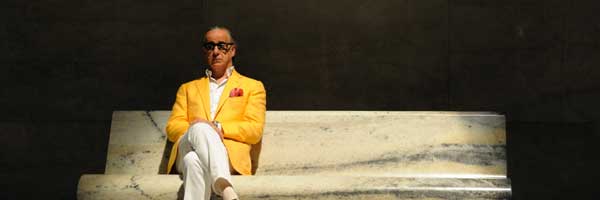The Great Beauty
Director: Paolo Sorrentino
Cast: Toni Servillo, Carlo Verdone, Sabrina Ferilli
Length: 142 minutes
Country: Italy
If The Great Beauty‘s protagonist, Jep Gambardella had lived fifty years ago, he would have been Marcello Mastroianni – black suit, fedora hat, horn-rimmed glasses and the eternal, “I will be right back” attitude. And The Great Beauty (La Grande Bellezza) would be a film by Frederico Fellini, possibly even his master- piece. However, since both Mastroianni and Fellini have been frequenting the restaurants of Heaven for almost twenty years, Rome is steered by director Paolo Sorrentino and his muse Toni Servillo. Though the glasses and the mood haven’t changed.
The film is almost begging for a comparison with the works of Fellini, especially La Dolce Vita and 8 1⁄2. Again, a refined decadence, chaotically elegant parties and elite Italy is shown. This mosaic is bound together by the already mentioned figure of Jep Gambardella, who gained the status of a legendary writer with his one and only novel, published several decades ago. We meet Gambardella at the party of his 65th birthday, a feast on a rooftop. Whilst the camera is slowly approaching his face, the orgy of sweaty bodies and music blur into a locomotive patch; Gambardella is slowly smoking, his tired eyes staring straight into the audience. The unmercifully wrinkled face of actor Tony Servillo is whispering: “sic transit gloria mundi. What have I become, my sweetest friend?” Gambardella dives into the search of the long-lost colours of life in the manner of Proust, constantly returning to the crystal clear memory of his first love. The elite of Rome are still dancing around him. Glasses and destinies are broken, but, alas, thus dawns the morning. After all, everything is a trick.
One of the most vivid characters of the film is Rome itself – relentless, weary, tremendous, and mysterious. It has recently become fashionable to analyse Rome as a cultural construct – I am thinking about Woody Allen’s To Rome with Love – but the city remains complicated. To Rome with Love was a mere collection of postcards, decorated with characters, vaguely searching for love. The secret doors of the eternal city are closed to Allen. Whereas Sorrentino, in contrast, demonstrates access to the most discreet Roman corners, literally unlocking the doors that are closed to mere mortals. Instead of visiting the Coliseum, Gambardella casually glances at it whilst lying in a hammock on the terrace of his apartment.
Of course, The Great Beauty cannot engulf the whole of Rome – and it doesn’t even try. In his 2008 film Il Divo, Sorrentino explored the Italian political elite, whereas The Great Beauty analyses the existence of another type of people: artists, aristocrats, the rich and the clergy. All of them are uniquely miserable and, as Gambardella says, can only share each other’s company, a drink and a laugh. These people are the actors of the Roman high society and he is their director. In his 1972 film Rome, Fellini argued that one of the most marvellous aspects of this city is that its size and diversity guarantees complete anonymity; however, Gambardella pursued the exact opposite. Ever since his arrival, he wanted to become the recognised king of Rome, destining his subjects’ lives with a mere flourish of his hand. And yet king Gambardella is the only one who knows that his kingdom is the vanity of vanities and it is exactly because of this knowledge that he suffers and searches eternally.
It may sound obvious, but The Great Beauty is very beautiful. Sorrentino’s long-term cinematographer Luca Bigazzi has reached the peak of his skill. The excess of unnecessary scenes and the ungracefulness of shift from scene onto scene that tormented Il Divo have been solved. In general, I think that this film demonstrates the growth of this director, both technically and thematically. The Great Beauty is stark improvement on Sorrentino’s This Must Be the Place (2011), in which the premise was good, the plot, acting, direction, and music were excellent, but the whole lacked an in-depth connection. Each scene required massive dedication and patience from the audience, who were kept on the verge of comprehending what, was it that the duet of Sean Penn and Sorrentino was trying to convey, but never reaching a full clarity of thought and turning the film into a feast of infantilism.
In contrast, The Great Beauty is a solid work without a trace of infantilism. If it wasn’t for its exquisite beauty, I would accuse the film of not leaving any breathing-space for the viewer. The density of its text is reminiscent of the novels of Marcel Proust. Yet contrarily to Proust, the film largely varies rhythmically, swinging from the elegies of Arvo Pärt to party anthems. This juxtaposition is prompted right from the beginning of the film: after witnessing the choir of women lamenting the nonsensical death of a tourist in the background of grand Roman monuments, we are immediately transported to Gambardella’s birthday party. It’s a contrast worthy of 15th century Dutch artist Hieronymus Bosch, suggesting that life and death go hand-in-hand in the timeless city of Rome. There is no respite and there never will be.
The Great Beauty is Paolo Sorrentino’s best film yet and I will not be surprised if in the upcoming Academy Awards it gets the Oscar for the Best Foreign Language Film. The Great Beauty is Frederico Fellini wandering through Berlusconi’s Rome. And even though Sorrentino’s cynicism towards this city is undeniable, it is also a dedication of love to the city so old. After all, morning always dawns, and Gambardella will write a new novel, most likely about time irretrievably lost, and those rare glimpses of beauty in our lives. Just don’t look at everything so seriously from behind your cigarette, Jep Gambardella – everything is but a trick.



Comments